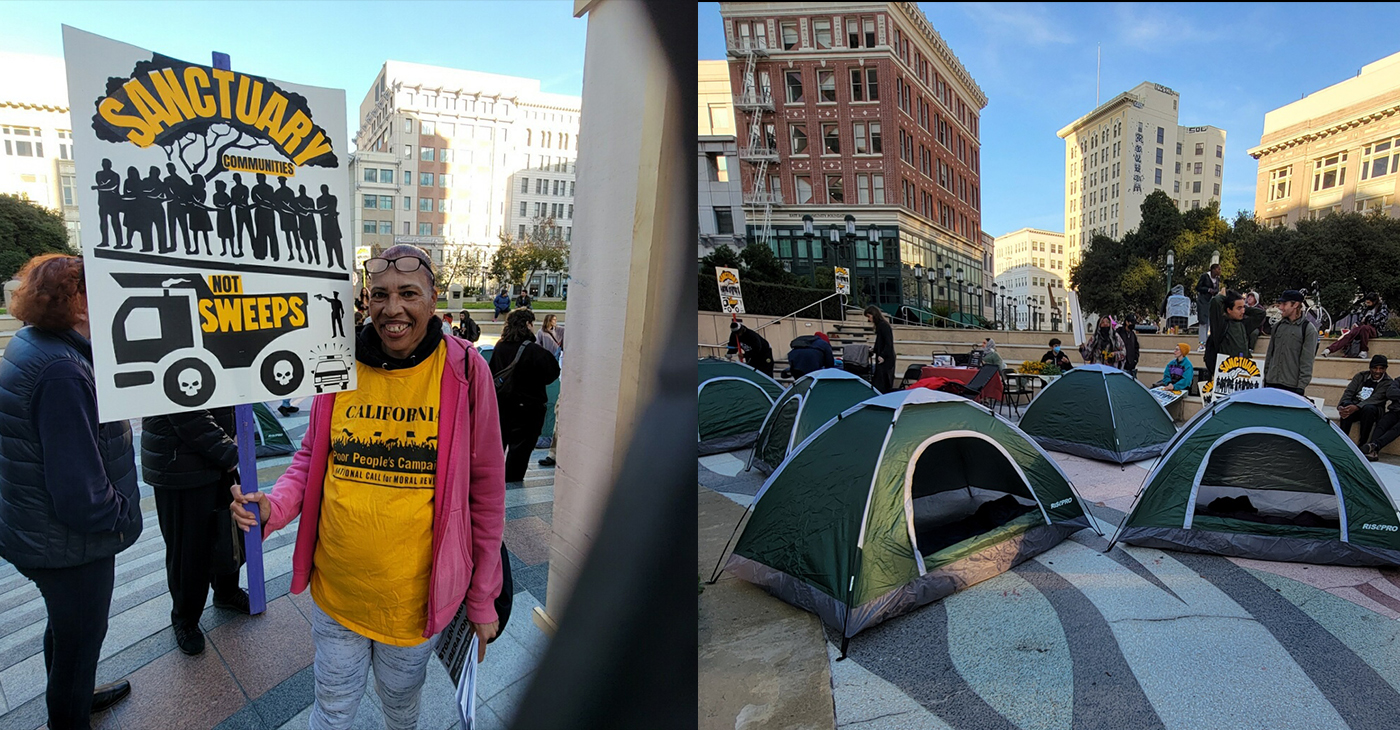City Government
Oakland Community Forum Hears Solutions for Affordable Housing, Renter Protection
Community members packed Oakland City Hall chambers Wednesday evening for a forum led by a panel of community leaders to discuss can be done to stop the tidal wave of displacement that is pushing long term residents out of the city and has escalated in the wake of the Ghost Ship fire.
“We are here to make recommendations and propose solutions. It’s not enough to just point fingers and blame,” said Post publisher Paul Cobb, who helped organize the community meeting, which brought together low-income tenants, artists and residents of warehouse spaces, housing rights activists and homeless people.
Councilmember-at-Large Rebecca Kaplan hosted and moderated the meeting for the community. Other council members who attended were Noel Gallo and Dan Kalb.

Bishop Bob Jackson. Photo by Cornelia Grimes.
The keynote speaker was Bishop Bob Jackson of Acts Full Gospel C.O.G.I.C. who has put together funding to build housing in East Oakland for low-income residents.
“It really grieves my spirit that so many people who are low income cannot afford to live in the city,” Bishop Jackson said, calling on faith-based organizations to step up to build housing that is truly affordable for Oaklanders.
“There are 3,000 vacant properties in the city, and the City of Oakland owns the majority,” he said “We can take the vacant lots and build on them. We can renovate those (abandoned) houses.”
Pastor Ken Chambers of Westside Missionary Baptist Church spoke of the need for living wage jobs for the unemployed and homeless in the city, many of whom are Black.
“In West Oakland you see tent cities. We’re starting to get comfortable seeing tents in this city,” said Pastor Chambers.
The city continues to make deals with developers so they can make large profits, he said. “(But) everything we build in this city should (include) jobs and job training.”
“We need to have cultural diversity in the city and at construction sites and in the (building) trades.”
Several speakers explained that not only are Oakland residents being impacted. Landlords and developers are raising rents and pushing out nonprofit agencies that serve low-income Oaklanders.

Jonah Strauss of the Oakland Warehouse Coalition. Photo by Tulio Ospina.
Jonah Strauss of the Oakland Warehouse Coalition presented a five-page proposal for an emergency tenant protection ordinance, which will be presented to the City Council on Jan. 17.
The warehouse coalition, formed in the aftermath of the Ghost Ship fire, advocates for “low-income people who live and or work in converted commercial and industrial spaces,” according to the written proposal.
“Our goal is to prevent displacement, as well as to make these properties safer.”
Immediate demands of the warehouse coalition include:
Extend tenant protections to all residents, regardless of zoning;
“Cease all Notices to Vacate, “red tags,” for non life threatening code violations and evictions;”
“Cease flash inspections of properties, unless there is proof of a life-threatening condition;”
Prohibit the use of anonymous code violation complaints as harassment and as a means to remove tenants.
Councilmember Kaplan underscored the need to stop city inspectors from contributing to the displacement crisis.
“There is no reason why we can’t fight for fire safety and for affordable housing,” she said.
“We cannot accept that the only solution is that we are going to displace everyone. We have to have a strategy that focuses on needed safety improvement while protecting renters.”
Cherri Murphy presented some of the proposals backed by the Oakland Justice Coalition:
Fully enact and enforce the newly approved Measure JJ renter’s protection ordinance;
Increase the number of affordable homeownership pathways;
Increase funding for community land trusts. This includes increasing taxes on development and real estate sales, using all city-owned surplus property for affordable housing, and directing city investments to create new affordable housing units;
Develop relationships with community members most affected by housing inequity, including Black and Brown neighbors, teachers, the homeless, artists, and any others who are typically pushed to the side.
James Vann of the Oakland Post Community Assembly called on the city to pass tenant protection ordinances that the city staff pledged over six months ago to work to implement.
The proposal includes requiring a mandatory mediation process in cases where landlords want to evict tenants for issues other than failure to pay rent. About 12,000 tenants were evicted last year in Oakland.
Vann also said the city should modify the definition of affordable housing. At present, he said, the overwhelming majority of Oakland residents cannot afford spaces that are defined as affordable by the city.
Bay Area
Glydways Breaking Ground on 14-Acre Demonstration Facility at Hilltop Mall
Glydways has been testing its technology at CCTA’s GoMentum Station in Concord for several years. The company plans to install an ambitious 28-mile Autonomous Transit Network in East Contra Costa County. The new Richmond facility will be strategically positioned near that project, according to Glydways.

The Richmond Standard
Glydways, developer of microtransit systems using autonomous, small-scale vehicles, is breaking ground on a 14-acre Development and Demonstration Facility at the former Hilltop Mall property in Richmond, the Contra Costa Transportation Authority (CCTA) reported on social media.
Glydways, which released a statement announcing the project Monday, is using the site while the mall property undergoes a larger redevelopment.
“In the interim, Glydways will use a portion of the property to showcase its technology and conduct safety and reliability testing,” the company said.
Glydways has been testing its technology at CCTA’s GoMentum Station in Concord for several years. The company plans to install an ambitious 28-mile Autonomous Transit Network in East Contra Costa County. The new Richmond facility will be strategically positioned near that project, according to Glydways.
The new Richmond development hub will include “over a mile of dedicated test track, enabling Glydways to refine its solutions in a controlled environment while simulating real-world conditions,” the company said.
Visitors to the facility will be able to experience on-demand travel, explore the control center and visit a showroom featuring virtual reality demonstrations of Glydways projects worldwide.
The hub will also house a 13,000-square-foot maintenance and storage facility to service the growing fleet of Glydcars.
“With this new facility [at the former Hilltop Mall property], we’re giving the public a glimpse of the future, where people can experience ultra-quiet, on-demand transit—just like hailing a rideshare, but with the reliability and affordability of public transit,” said Tim Haile, executive director of CCTA.
Janet Galvez, vice president and investment officer at Prologis, owner of the Hilltop Mall property, said her company is “thrilled” to provide space for Glydways and is continuing to work with the city on future redevelopment plans for the broader mall property.
Richmond City Manager Shasa Curl added that Glydways’ presence “will not only help test new transit solutions but also activate the former Mall site while preparation and finalization of the Hilltop Horizon Specific Plan is underway.
Alameda County
Last City Council Meeting of the Year Ends on Sour Note with Big Budget Cuts
In a five to one vote, with Councilmembers Carroll Fife and Janani Ramachandran excused, the council passed a plan aimed at balancing the $130 million deficit the city is facing. Noel Gallo voted against the plan, previously citing concerns over public safety cuts, while Nikki Fortunato-Bas, Treva Reid, Rebecca Kaplan, Kevin Jenkins, and Dan Kalb voted in agreement with the plan.

By Magaly Muñoz
In the last lengthy Tuesday meeting of the Oakland City Council for 2024, residents expressed strong opposition to the much needed budget cuts before a change in leadership was finalized with the certification of election results.
In a five to one vote, with Councilmembers Carroll Fife and Janani Ramachandran excused, the council passed a plan aimed at balancing the $130 million deficit the city is facing. Noel Gallo voted against the plan, previously citing concerns over public safety cuts, while Nikki Fortunato-Bas, Treva Reid, Rebecca Kaplan, Kevin Jenkins, and Dan Kalb voted in agreement with the plan.
Oakland police and fire departments, the ambassador program, and city arts and culture will all see significant cuts over the course of two phases.
Phase 1 will eliminate two police academies, brown out two fire stations, eliminate the ambassador program, and reduce police overtime by nearly $25 million. These, with several other cuts across departments, aim to save the city $60 million. In addition, the council simultaneously approved to transfer restricted funds into its general purpose fund, amounting to over $40 million.
Phase 2 includes additional fire station brownouts and the elimination of 91 jobs, aiming to recover almost $16 million in order to balance the rest of the budget.
Several organizations and residents spoke out at the meeting in hopes of swaying the council to not make cuts to their programs.
East Oakland Senior Center volunteers and members, and homeless advocates, filled the plaza just outside of City Hall with rallies to show their disapproval of the new budget plan. Senior residents told the council to “remember that you’ll get old too” and that disturbing their resources will only bring problems for an already struggling community.
While city staff announced that there would not be complete cuts to senior center facilities, there would be significant reductions to staff and possibly inter-program services down the line.
Exiting council member and interim mayor Bas told the public that she is still hopeful that the one-time $125 million Coliseum sale deal will proceed in the near future so that the city would not have to continue with drastic cuts. The deal was intended to save the city for fiscal year 2024-25, but a hold up at the county level has paused any progress and therefore millions of dollars in funds Oakland desperately needs.
The Coliseum sale has been a contentious one. Residents and city leaders were originally against using the deal as a way to balance the budget, citing doubts about the sellers, the African American Sports and Entertainment Group’s (AASEG), ability to complete the deal. Council members Reid, Ramachandran, and Gallo have called several emergency meetings to understand where the first installments of the sale are, with little to no answers.
Bas added that as the new Alameda County Supervisor for D5, a position she starts in a few weeks, she will do everything in her power to push the Coliseum sale along.
The city is also considering a sales tax measure to put on the special election ballot on April 15, 2025, which will also serve as an election to fill the now vacant D2 and mayor positions. The tax increase would raise approximately $29 million annually for Oakland, allowing the city to gain much-needed revenue for the next two-year budget.
The council will discuss the possible sales tax measure on January 9.
Activism
Protesters Gather in Oakland, Other City Halls, to Halt Encampment Sweeps
The coordinated protests on Tuesday in San Francisco, Oakland, Vallejo, Fresno, Los Angeles and Seattle, were hosted by Poor Magazine and Wood Street Commons, calling on cities to halt the sweeps and focus instead on building more housing.

By Post Staff
Houseless rights advocates gathered in Oakland, San Francisco, Los Angeles, and other city halls across California and Washington state this week protesting increased sweeps that followed a U.S. Supreme Court decision over the summer.
The coordinated protests on Tuesday in San Francisco, Oakland, Vallejo, Fresno, Los Angeles and Seattle, were hosted by Poor Magazine and Wood Street Commons, calling on cities to halt the sweeps and focus instead on building more housing.
“What we’re dealing with right now is a way to criminalize people who are dealing with poverty, who are not able to afford rent,” said rights advocate Junebug Kealoh, outside San Francisco City Hall.
“When someone is constantly swept, they are just shuffled and things get taken — it’s hard to stay on top of anything,” said Kealoh.
Local houseless advocates include Victoria King, who is a member of the coordinating committee of the California Poor People’s Campaign. She and Dr. Monica Cross co-chair the Laney Poor People’s Campaign.
The demonstrations came after a June Supreme Court ruling expanded local governments’ authority to fine and jail people for sleeping outside, even if no shelter is available. Gov. Gavin Newsom in California followed up with an order directing state agencies to crack down on encampments and urging local governments to do the same.
Fresno, Berkeley and a host of other cities implemented new rules, making it easier for local governments to clear sidewalk camps. In other cities, such as San Francisco, officials more aggressively enforced anti-camping laws already on the books.
-

 California Black Media4 weeks ago
California Black Media4 weeks agoCalifornia to Offer $43.7 Million in Federal Grants to Combat Hate Crimes
-

 Black History4 weeks ago
Black History4 weeks agoEmeline King: A Trailblazer in the Automotive Industry
-

 California Black Media4 weeks ago
California Black Media4 weeks agoGov. Newsom Goes to Washington to Advocate for California Priorities
-

 Activism4 weeks ago
Activism4 weeks agoOakland Post: Week of November 27 – December 3, 2024
-

 California Black Media4 weeks ago
California Black Media4 weeks agoCalifornia Department of Aging Offers Free Resources for Family Caregivers in November
-

 Activism2 weeks ago
Activism2 weeks agoButler, Lee Celebrate Passage of Bill to Honor Congresswoman Shirley Chisholm with Congressional Gold Medal
-

 Activism2 weeks ago
Activism2 weeks agoPost News Group to Host Second Town Hall on Racism, Hate Crimes
-

 Activism2 weeks ago
Activism2 weeks agoDelta Sigma Theta Alumnae Chapters Host World AIDS Day Event






















































